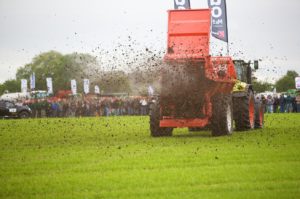 Farmers could significantly boost grass yields and quality by making better use of soil and manure analysis, according to experts speaking at the Grassland & Muck Event.
Farmers could significantly boost grass yields and quality by making better use of soil and manure analysis, according to experts speaking at the Grassland & Muck Event.
Around 40-45% of UK grassland is deficient in potash, and more than half has a pH below six, dramatically reducing the efficiency of nutrient uptake by plants, says Jon Telfer, development manager of analytical services at Yara. “Supplies of soil sulphur are more or less exhausted: There are a huge number of soils that need attention, and some really straightforward gaps to be plugged.”
A comprehensive soil test typically costs around £30 and will be valid for about five years, so the return on investment can be considerable, says Mr Telfer. “If you’re applying fertiliser to a soil with a low pH, or the incorrect grade of fertiliser, it will look very expensive. This is about taking a measure to manage approach: A nutrient management plan will only be as good as the data you put into it.”
Visitors to this year’s event will be able to bring their soil problems along to discuss with ADAS experts in the Soil Management Clinic, where they can also examine soil structure and hear how to remedy common issues like compaction.
The second step to creating a nutrient management plan is to measure the nutrient content of organic manures. Yara analysis has shown that this can vary by a huge amount – the equivalent of up to £34/acre. “A nutrient-rich slurry might deliver 64kg/ha of nitrogen, 81kg/ha of phosphate and 129kg/ha of potash,” says Mr Telfer. “Compare that to slurry with a low nutrient content of 21kg/ha of nitrogen, 26kg/ha of phosphate and 44kg/ha of potash and you can see that the extra fertiliser required to make up the difference is significant.”
Average figures for the nutrient content of manures are published in the RB209 handbook – the new version of which will include digestate for the first time and is being released at the Grassland & Muck event. However, within those average figures there is a wide range, so without testing their manures farmers may well be over- or under-applying fertiliser, says Mr Telfer.
Taking a balanced approach to crop nutrition will not only boost grass yields, but also forage quality, he adds. “The sulphur to nitrogen ratio is critical; it affects the level of protein, sugar and starch in the grass, as well as its digestibility. Micronutrients are also important: There is life beyond 20.10.10 and it doesn’t have to be difficult.”
John Williams, principal soil scientist at ADAS, will be speaking about manure management to maximise nutrient use efficiency, and says farmers should target manure applications at fields with indices of two and below for phosphate and potash. “Slurry and muck is a hugely valuable source of nutrients – worth around £270/ha in fertiliser replacement value. But if a soil isn’t deficient then the nutrients are of less value, and the point is to make the biggest savings possible.”
Timing and application technique will influence the efficiency of nutrient uptake, says Mr Williams. “If possible, separate your slurry as most of the phosphate and organic matter will be in the solids, with most of the available nitrogen in the liquid – that way you can better target its use.”
It’s also important to measure the quantity being applied. “Fresh farmyard manure is less dense than older manure, so use weigh cells or a weighbridge to calculate how much you’re applying.” Decent equipment will ensure an even spread of material, with dribble bars or injectors minimising atmospheric losses from slurry and ensuring grass can be grazed or harvested more quickly, says Mr Williams.
Having measured the nutrient content in manures, farmers can then top up with inorganic fertiliser to meet the crop requirements. “There are lots of little tweaks that add up to major savings,” he explains. “Treat your muck like the valuable fertiliser it is and it will undoubtedly save you a lot of money.”
- Tickets for Grassland & Muck 2017 are now on sale and visitors can save £4 per ticket by purchasing in advance. For more information visit grasslandevent.co.uk




